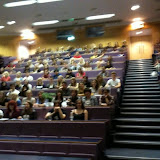Pages
Thursday, 30 September 2010
Peer Mentor drop-in sessions TODAY
The Peer Mentors will be running drop-in sessions today. You can go along and ask them questions about any aspect of your course and your experience at Manchester, and they will give you help, information and moral support!
National Student Survey highlights (2010)
1. Staff are good at explaining things: 95%
2. Staff have made the subject interesting: 88%
3. Staff are enthusiastic about what they are teaching: 97%
4. The course is intellectually stimulating: 98%
Teaching section average score: 95%
This is the joint highest score in the University
Wednesday, 29 September 2010
Office hours, 2010 Semester One
Undergraduate Programme Director
Dr Jerome de Groot, Room S.1.16
Tuesday 1-2, Thursday 10-11
Course Unit Directors Level 1
Dr Daniela Caselli, Room W105
CUD, Reading Literature
10-11 Wednesday, 12-1Thursday
Prof. Gale Owen-Crocker, Room S.1.11
CUD, Mapping the Medieval
Mondays 1-2, Tuesdays 1-2
Dr. David Matthews, Room S.1.6
CUD, Academic Development
Tuesday 11-12, Wednesday 12-1
Dr. Natalie Zacek, Room N2.8
CUD American History
Tuesdays 4-5, Thursdays 3-4
Prof. Brian Ward, N112
CUD, Jamestown to James Brown
Monday 10-11, Tuesday 10-11
Course Unit Directors Level 2
Dr. Noelle Gallagher, Room S.1.25
CUD, Writing the C18
Wednesdays 12-1, Thursdays 4-6
Dr. Jerome de Groot, Room S.1.16
CUD, Power and Gender
Tuesday 1-2, Thursday 10-11
Dr. David Matthews, Room S.1.6
CUD, Chaucer
Tuesday 11-12, Wednesday 12-1
Dr. David Alderson, Room W118
CUD, Gender, Sexuality and Culture
5-6 Monday, 1-2 Tuesday
Dr. Jennie Chapman, Room W.1.09
CUD American Literature and Social Criticism
Thursday 2-4
Tuesday, 28 September 2010
Manchester Lit List: Bernard Cornwell, creator of Sharpe, to visit Manc...
Research Seminar
Academic Advisors
| Meeting | Possible topics for discussion |
| Year 1: 1 | Essay writing and preparation |
| Year 1: 2 | Academic Writing and exam preparation PADP preparation Review of feedback |
| Year 1: 3 | Preparation for L2: registration choices, academic progress Exam preparation Review of feedback from semester 1 Student Satisfaction Survey |
| Year 2: 1 | Academic development in L2: academic progress |
| Year 2: 2 | Preparation for L3: registration choices, academic progress, Long Essay Exam preparation Review of feedback from semester 1 Student Satisfaction Survey |
| Year 3: 1 | Postgraduate course and careers information Long Essay topic: agree title Student Satisfaction Survey |
| Year 3: 2 | Approaching your final assessment References Student Satisfaction Survey |
Monday, 27 September 2010
Twitter staff profiles
interests - difficult to fit into 140 characters, see how they do:
https://twitter.com/EASManchester
Arts events in the next weeks
Manchester Literature Festival: http://www.manchesterliteraturefestival.co.uk/
Manchester Weekender (includes AND digital arts festival, Un-Convention music events and various bits of Mancunian mayhem): http://www.creativetourist.com/city-guides/weekender-listings
Dr Faustus at the Royal Exchange: http://www.royalexchangetheatre.org.uk/page.aspx
Friday, 24 September 2010
THE FUTURE OF AFRICAN LITERATURE
Wednesday 13th October, 5.30 pm
Main Arts Lecture Theatre, Samuel Alexander Building, Lime Grove, University of Manchester.
A distinguished short story writer himself, Chuma Nwokolo is the Editor and Publisher of AFRICAN WRITING, a partner in a scheme to promote creative writing education in Nigeria, led by the University of Manchester's Centre for New Writing with funding through the British Council.
Mr Nwokolo will be looking at the opportunities and obstacles to creativity and and publishing in Nigerian and the wider African context.
Mr Nwokolo's has been writer in residence at the Ashmolean Museum, Oxford, a teacher of creative writing at Brookes University, Oxford.
His story, Diary of a Dead African, was chosen by La Internazionale as one of the three best stories worldwide in 2003.
Contact: Geoff Ryman
E-mail: Geoffrey.Ryman@manchester.ac.ukFrank Kermode remembered
http://www.lrb.co.uk/v32/n18/stefan-collini-and-others/memories-of-frank-kermode
Calling all readers of historical fiction
Readers', http://meetthereaders.blogspot.com/
Thursday, 23 September 2010
GTA Representatives
Wednesday, 22 September 2010
Tuesday, 21 September 2010
First year meeting and welcome party
some wine!
Monday, 20 September 2010
First years: School Welcome Meeting
Thursday, 9 September 2010
Welcome to all new first years!
taste of Manchester! There is a welcome meeting for you on Wednesday 22
September at 5 followed by a party and we look forward to welcoming you
then.
Feedback on your performance
Feedback can be given in a number of ways – formally, through sheets attached to submitted work or discussion with your Academic Advisor, or informally, through comments and advice given during class or via email. Be sure to use the feedback you are given to improve your work and develop your learning.
Assessment information and criteria
The assessment criteria for our modules is here, make sure you take a look before preparing your work so that you know what is being looked at: http://www.currentstudents.arts.manchester.ac.uk/ug/sa/eas/assessmentcriteria.pdf
There is also information relating to assessment and feedback in the handbook, including information relating to referencing: http://www.currentstudents.arts.manchester.ac.uk/ug/pdf/handbooks/handbooks200910/EngLit,%20200910.pdf
There is information, links, websites and advice on how to improve your essay writing on all Blackboard courses. If you have any specific questions contact your Course Unit Director or seminar leader.
Key Contacts
Programme Administrator: Simon.c.cummins@manchester.ac.uk
Undergraduate Programme Director: Jerome.degroot@manchester.ac.uk
Assessment administrator: Suzanne.evans@manchester.ac.ukStudent Representation
Staff Student Liaison Committee
Information about Student Representation can be found here:
http://www.currentstudents.arts.manchester.ac.uk/ug/studentreps/index.htm
Joint Honours and Combined Studies Students should check the SSLC information relating to their home discipline or department.Peer Mentors
The Peer Mentors will be running surgery consultation drop-in sessions in the Poetry Centre every Thursday 1-2 during term. This is a forum for discussion and advice on any area of undergraduate life, with an emphasis on your degree work. All first years welcome. For further information contact Joe White: Joseph.White-2@student.manchester.ac.uk
